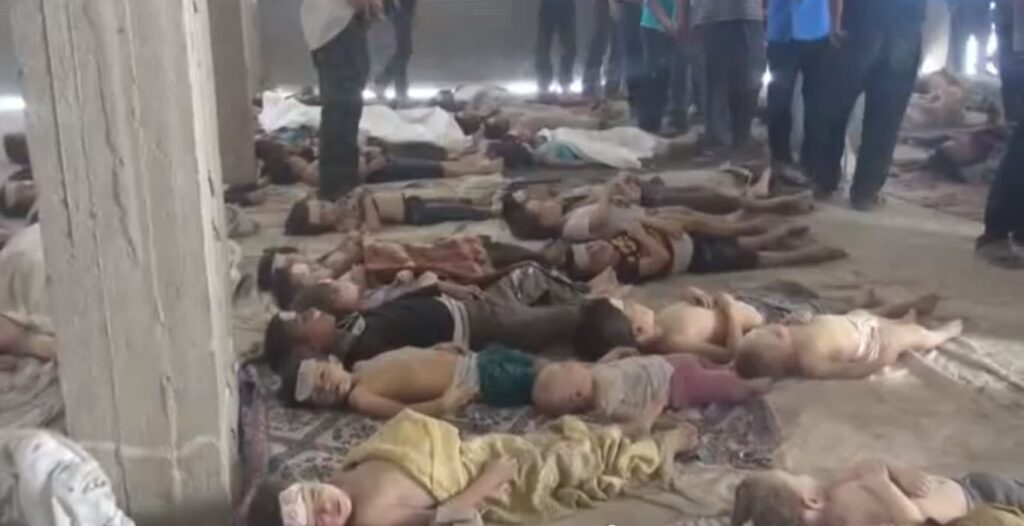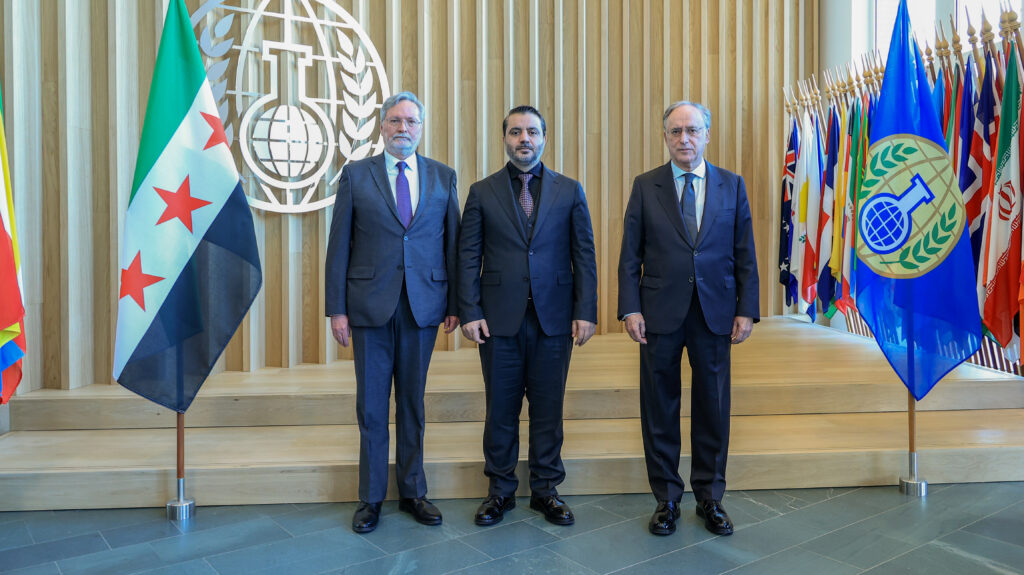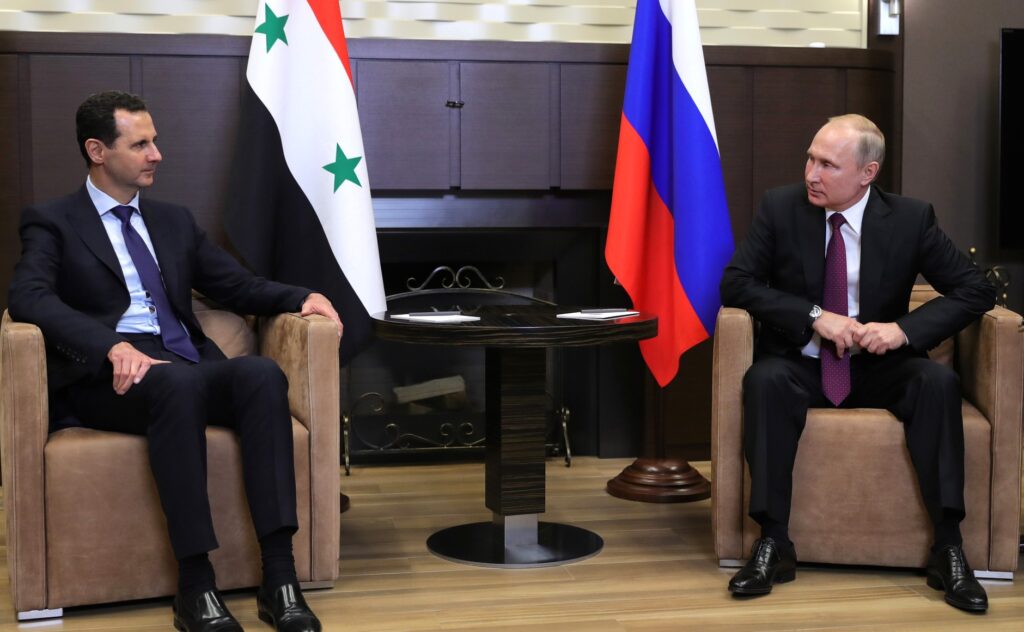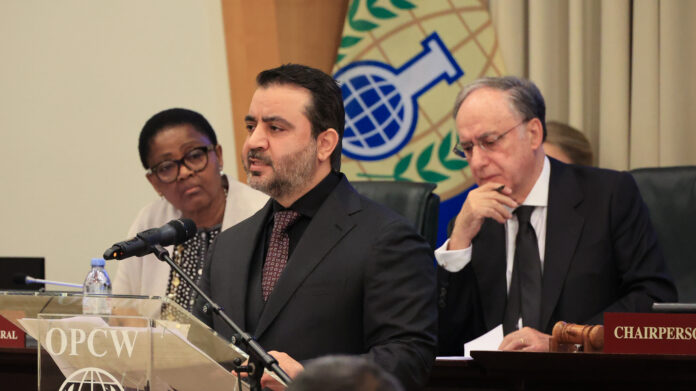By Patrick Norén
CBNW Magazine Editor Patrick Norén tracks developments in addressing Syria’s chemical weapons program since the fall of Bashar al-Assad in December 2024.
The Syrian regime led by Bashar al-Assad had been one of the most egregious employers of chemical weapons in modern times. The most infamous and deadly attack on August 21, 2013, in which Assad forces launched rockets filled with sarin gas into the Damascus suburb of Ghouta in an attempt to expel rebels, killed over 1,000 people, including hundreds of children.
Facing international condemnation and threatened by U.S. military strikes to prevent further chemical weapons attacks, the Syrian regime acceded to the Chemical Weapons Convention a matter of weeks after the Ghouta attack. Despite a promising start in which over 90% of the declared stockpiles had been removed from Syria by April 2014 and were being gradually destroyed elsewhere, allegations of attacks using predominantly chlorine and sarin gas by Syrian forces kept emerging. It became clear that the initial declarations made by Syria on their accession to the Chemical Weapons Convention were incomplete and inaccurate, with significant stockpiles unaccounted for.
The Organisation for the Prohibition of Chemical Weapons (OPCW) Investigation and Identification Team, established in 2018 with the explicit mandate to identify the perpetrators of chemical weapons attacks in Syria, has attributed five attacks throughout 2017 and 2018 to regime forces.
Meanwhile, a lack of cooperation from government authorities led to some of Syria’s rights in the policy-making organs of the OPCW being suspended in April 2021.

The Fall of Bashar al-Assad
The rapid and sudden fall of the regime on December 8, 2024, was a watershed moment for the tens of thousands of Syrians who had endured the excruciating pain of Bashar al-Assad’s chemical warfare against his own people. With survivors now able to speak freely for the first time in years, many have recounted harrowing stories of chemical explosions, foaming mouths, choking children, and scores of dead in the street.
The day after the fall of Bashar al-Assad, the OPCW issued a statement that it was “monitoring closely the recent developments in Syria”, and had reminded the country of their obligations under the Chemical Weapons Convention.
Three days later, an extraordinary meeting of the Executive Council of the OPCW directly addressed the fate of the Syrian chemical weapons program amid the political instability. The OPCW Director-General, Fernando Arias, said during the meeting that the Secretariat had been “closely monitoring the situation in Syria with special attention to the status of its chemical weapons-related sites” and added that the “ultimate goal is to achieve the complete elimination of Syria’s chemical weapons program, and to take part in the process of the international accountability of the former Syrian government and any other identified perpetrators”.
Israeli Intervention
Following the overthrow of Assad, Israel took advantage of the instability and proceeded to bomb sites across Syria believed to be associated with its chemical weapons program. Speaking to journalists on December 9, the Israeli Foreign Minister Gideo Sa’ar said that his country had done so to stop “strategic weapons systems” from falling into the hands of “extremists”. Israel is one of four members of the United Nations that are not States Parties to the Chemical Weapons Convention, along with Egypt, North Korea, and South Sudan.
Speaking at the extraordinary meeting of the OPCW Executive Council only three days later, Director-General Arias noted the reports of airstrikes targeting suspected chemical weapons sites. Although the strikes may well have destroyed some stockpiles, he also cautioned that it could have resulted in contamination and destroyed evidence needed for prosecuting associated war crimes.
At the same time, Arias commented that there had been “positive signals from within Syria” about the importance of ridding the country of its chemical weapons, but, at the same time, noted that the OPCW had not yet received any official request from the new authorities.
Nevertheless, the desire to close the book on Syria’s chemical weapons program would not preclude criminal investigations. Arias explicitly stated that the OPCW would endeavor to bring the perpetrators of the previous government’s crimes to justice.

Nine-Point Action Plan
On January 22, 2025, during a period when the only official lines of communication between the OPCW and Syrian authorities went through Qatar, the OPCW presented its nine-point action plan to address the Syrian chemical weapons program amid the new political reality.
These points included:
- Establishing first contacts with the new Syrian authorities
- Preparing a first deployment to the country since the end of the previous regime
- Preparing a larger deployment of experts to Syria
- Drawing up an inventory of chemical weapons sites, equipment, munitions, and supporting documents, evidence, and witness testimonies related to the previous regime’s chemical weapons program
- Requesting a new chemical weapons declaration by Syrian authorities
- Assessing and verifying the declaration, and destroying the declared stockpiles
- OPCW engagement with Syria to address proliferation and re-emergence concerns, as well as assisting with capacity building and long-term compliance with the Chemical Weapons Convention
- Continued investigations by OPCW entities, including by fact-finding missions and the Investigation and Identification Team
- Evaluating lessons learned, and retaining knowledge, expertise, and capabilities for the future
At the same time, it was revealed that Director-General Arias had accepted an informal invitation from the caretaker Syrian Foreign Minister, Asaad Hassan al-Shaibani, to visit Damascus despite no dates having been set and Syria having not appointed officials and experts in charge of engaging with the OPCW Secretariat.
A New Hope
This visit of an OPCW delegation led by Fernando Arias to Syria took place on February 8, exactly two months after Bashar al-Assad had been overthrown.
A press release commented that discussions were “long, productive and very open, with an in-depth exchange of information”, and served as a good basis to end the eleven years of stalemate, stagnation, obstruction, and lack of progress experienced during the previous regime. It is understood that Syria nominated an interim focal point for chemical weapons during this visit.
This was then followed by the caretaker Syrian Foreign Minister heading to The Hague on March 5 for the 108th session of the OPCW Executive Council during which he emphasized his government’s determination to “reconstruct the future of the new Syria based on transparency, justice, and cooperation with the international community”.
He explicitly noted Syria’s commitment to destroy what is left of the Assad regime’s chemical weapons program, bring justice to victims, and ensure solid compliance with international law with the support of the international community and the OPCW. During this meeting, Director-General Arias added that an OPCW team of executive experts would be deployed to Damascus in the days following the Executive Council meeting.
Further diplomatic optimism kept on coming. Two days later at a meeting of the United Nations Security Council in New York, several countries voiced their support of the new Syrian authorities’ verbal commitment to rid the country of chemical weapons, bring justice to the victims of the previous regime’s crimes, and prosecute the perpetrators.
U.S. Ambassador Dorothy Shea stressed the importance of bringing Syria into compliance with its obligations under the Chemical Weapons Convention, and preventing the proliferation of chemical weapons remnants into the wrong hands.
“The window of opportunity is short. All stakeholders need to act quickly to facilitate the work of the OPCW,” said Ambassador Shea, adding that the U.S. “welcomes” initial positive steps.
U.K. representative Fergus Eckersley called the fall of Assad a “golden opportunity” to destroy Syria’s chemical weapons program. The representative of Panama said that the new political reality posed an opportunity that “should not be squandered”, Slovenia emphasized the imperative of justice for the victims of Assad’s chemical weapons crimes, and Syria’s representative stressed their intention to adopt a new foreign policy and called for the reinstatement of the country’s rights and privileges as a State Party to the Chemical Weapons Convention.

Russian Aspersions
Predictably, the Russian representative at the Security Council meeting took the opportunity to cast aspersions on the integrity and impartiality of any OPCW mission sent to Syria, claiming that addressing Syria’s chemical weapons program is “not the top priority for the current authorities”.
The statement made by the caretaker Syrian Foreign Minister at the OPCW Executive Council meeting only two days prior, however, would suggest the opposite to be true. He told the OPCW Executive Council in The Hague on March 5: “Our commitment today at the Executive Council is to destroy any remains of the chemical weapons program developed under the Assad regime, to put an end to this painful legacy, to bring justice to victims, and to ensure that the compliance with international law is a solid one.”
It is important to recall that the OPCW has twice confirmed that riot control agents have been used against Ukrainian positions during the Russian invasion of Ukraine. However, in the absence of OPCW bodies such as the Investigation and Identification Team, which is mandated to identify the perpetrators of specific instances of chemical weapons use in Syria only, the Organisation is not able to apportion blame for alleged violations of the Chemical Weapons Convention in Ukraine. Russia was also a long-standing ally of Bashar al-Assad during the Syrian Civil War, and granted the deposed leader asylum after he fled the country in December last year.

Renewed Momentum
The rapid and unexpected collapse of the Assad regime last year has given a renewed impetus to address outstanding deficiencies in Syria’s original chemical weapons declaration. The signals being sent by the new Syrian authorities are positive and commendable, as are the OPCW’s proactive efforts to seize the opportunity and deploy diplomatic and scientific delegations as quickly as possible.
Some countries who have long been critical of the former regime’s actions vis-à-vis the Chemical Weapons Convention are putting their money where their mouth is to support OPCW missions to Syria. Monaco has contributed €10,000, New Zealand has contributed €20,000, and the Netherlands has contributed a whopping €500,000. It will be worth keeping an eye on further contributions from other countries as a measure of international support for Syria’s new chapter and States Parties’ commitment to upholding the Chemical Weapons Convention.
The fall of the Assad regime in Syria will test the mettle of the OPCW, States Parties, and the international community to bring chemical security to the country, accountability to the former regime, and justice to victims. Given allegations of chemical weapons use in the battlefields of Ukraine and in the jungles of Myanmar, it may seem that global chemical weapons security is regressing. However, a coalition of the willing can prove the opposite and bring renewed vigor and confidence to the global non-proliferation movement amid challenging times.
Patrick Norén is the Editor of CBNW Magazine.




